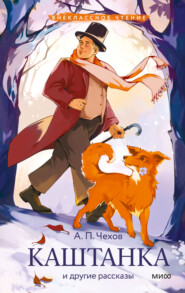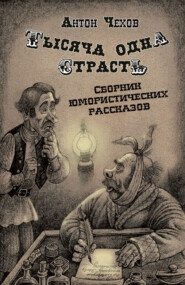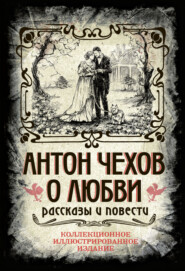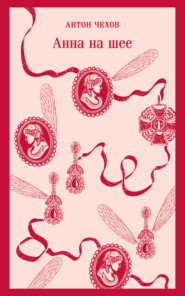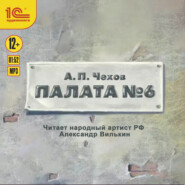По всем вопросам обращайтесь на: info@litportal.ru
(©) 2003-2025.
✖
The Cook's Wedding and Other Stories
Настройки чтения
Размер шрифта
Высота строк
Поля
This poor, foolish, queer creature, whom I loved the more warmly the more ragged and dirty his smart summer overcoat became, had come to Moscow, five months before, to look for a job as copying-clerk. For those five months he had been trudging about Moscow looking for work, and it was only on that day that he had brought himself to go into the street to beg for alms.
Before us was a big house of three storeys, adorned with a blue signboard with the word "Restaurant" on it. My head was drooping feebly backwards and on one side, and I could not help looking upwards at the lighted windows of the restaurant. Human figures were flitting about at the windows. I could see the right side of the orchestrion, two oleographs, hanging lamps.. Staring into one window, I saw a patch of white. The patch was motionless, and its rectangular outlines stood out sharply against the dark, brown background. I looked intently and made out of the patch a white placard on the wall. Something was written on it, but what it was, I could not see..
For half an hour I kept my eyes on the placard. Its white attracted my eyes, and, as it were, hypnotised my brain. I tried to read it, but my efforts were in vain.
At last the strange disease got the upper hand.
The rumble of the carriages began to seem like thunder, in the stench of the street I distinguished a thousand smells. The restaurant lights and the lamps dazzled my eyes like lightning. My five senses were overstrained and sensitive beyond the normal. I began to see what I had not seen before.
"Oysters." I made out on the placard.
A strange word! I had lived in the world eight years and three months, but had never come across that word. What did it mean? Surely it was not the name of the restaurant-keeper? But signboards with names on them always hang outside, not on the walls indoors!
"Papa, what does 'oysters' mean?" I asked in a husky voice, making an effort to turn my face towards my father.
My father did not hear. He was keeping a watch on the movements of the crowd, and following every passer-by with his eyes… From his eyes I saw that he wanted to say something to the passers-by, but the fatal word hung like a heavy weight on his trembling lips and could not be flung off. He even took a step after one passer-by and touched him on the sleeve, but when he turned round, he said, "I beg your pardon," was overcome with confusion, and staggered back.
"Papa, what does 'oysters' mean?" I repeated.
"It is an animal.. that lives in the sea."
I instantly pictured to myself this unknown marine animal… I thought it must be something midway between a fish and a crab. As it was from the sea they made of it, of course, a very nice hot fish soup with savoury pepper and laurel leaves, or broth with vinegar and fricassee of fish and cabbage, or crayfish sauce, or served it cold with horse-radish… I vividly imagined it being brought from the market, quickly cleaned, quickly put in the pot, quickly, quickly, for everyone was hungry.. awfully hungry! From the kitchen rose the smell of hot fish and crayfish soup.
I felt that this smell was tickling my palate and nostrils, that it was gradually taking possession of my whole body… The restaurant, my father, the white placard, my sleeves were all smelling of it, smelling so strongly that I began to chew. I moved my jaws and swallowed as though I really had a piece of this marine animal in my mouth.
My legs gave way from the blissful sensation I was feeling, and I clutched at my father's arm to keep myself from falling, and leant against his wet summer overcoat. My father was trembling and shivering. He was cold.
"Papa, are oysters a Lenten dish?" I asked.
"They are eaten alive." said my father. "They are in shells like tortoises, but.. in two halves."
The delicious smell instantly left off affecting me, and the illusion vanished… Now I understood it all!
"How nasty," I whispered, "how nasty!"
So that's what "oysters" meant! I imagined to myself a creature like a frog. A frog sitting in a shell, peeping out from it with big, glittering eyes, and moving its revolting jaws. I imagined this creature in a shell with claws, glittering eyes, and a slimy skin, being brought from the market… The children would all hide while the cook, frowning with an air of disgust, would take the creature by its claw, put it on a plate, and carry it into the dining-room. The grown-ups would take it and eat it, eat it alive with its eyes, its teeth, its legs! While it squeaked and tried to bite their lips..
I frowned, but.. but why did my teeth move as though I were munching? The creature was loathsome, disgusting, terrible, but I ate it, ate it greedily, afraid of distinguishing its taste or smell. As soon as I had eaten one, I saw the glittering eyes of a second, a third.. I ate them too… At last I ate the table-napkin, the plate, my father's goloshes, the white placard.. I ate everything that caught my eye, because I felt that nothing but eating would take away my illness. The oysters had a terrible look in their eyes and were loathsome. I shuddered at the thought of them, but I wanted to eat! To eat!
"Oysters! Give me some oysters!" was the cry that broke from me and
I stretched out my hand.
"Help us, gentlemen!" I heard at that moment my father say, in a hollow and shaking voice. "I am ashamed to ask but – my God! – I can bear no more!"
"Oysters!" I cried, pulling my father by the skirts of his coat.
"Do you mean to say you eat oysters? A little chap like you!" I heard laughter close to me.
Two gentlemen in top hats were standing before us, looking into my face and laughing.
"Do you really eat oysters, youngster? That's interesting! How do you eat them?"
I remember that a strong hand dragged me into the lighted restaurant. A minute later there was a crowd round me, watching me with curiosity and amusement. I sat at a table and ate something slimy, salt with a flavour of dampness and mouldiness. I ate greedily without chewing, without looking and trying to discover what I was eating. I fancied that if I opened my eyes I should see glittering eyes, claws, and sharp teeth.
All at once I began biting something hard, there was a sound of a scrunching.
"Ha, ha! He is eating the shells," laughed the crowd. "Little silly, do you suppose you can eat that?"
After that I remember a terrible thirst. I was lying in my bed, and could not sleep for heartburn and the strange taste in my parched mouth. My father was walking up and down, gesticulating with his hands.
"I believe I have caught cold," he was muttering. "I've a feeling in my head as though someone were sitting on it… Perhaps it is because I have not.. er.. eaten anything to-day… I really am a queer, stupid creature… I saw those gentlemen pay ten roubles for the oysters. Why didn't I go up to them and ask them.. to lend me something? They would have given something."
Towards morning, I fell asleep and dreamt of a frog sitting in a shell, moving its eyes. At midday I was awakened by thirst, and looked for my father: he was still walking up and down and gesticulating.
HOME
"SOMEONE came from the Grigoryevs' to fetch a book, but I said you were not at home. The postman brought the newspaper and two letters. By the way, Yevgeny Petrovitch, I should like to ask you to speak to Seryozha. To-day, and the day before yesterday, I have noticed that he is smoking. When I began to expostulate with him, he put his fingers in his ears as usual, and sang loudly to drown my voice."
Yevgeny Petrovitch Bykovsky, the prosecutor of the circuit court, who had just come back from a session and was taking off his gloves in his study, looked at the governess as she made her report, and laughed.
"Seryozha smoking." he said, shrugging his shoulders. "I can picture the little cherub with a cigarette in his mouth! Why, how old is he?"
"Seven. You think it is not important, but at his age smoking is a bad and pernicious habit, and bad habits ought to be eradicated in the beginning."
"Perfectly true. And where does he get the tobacco?"
"He takes it from the drawer in your table."
"Yes? In that case, send him to me."
When the governess had gone out, Bykovsky sat down in an arm-chair before his writing-table, shut his eyes, and fell to thinking. He pictured his Seryozha with a huge cigar, a yard long, in the midst of clouds of tobacco smoke, and this caricature made him smile; at the same time, the grave, troubled face of the governess called up memories of the long past, half-forgotten time when smoking aroused in his teachers and parents a strange, not quite intelligible horror. It really was horror. Children were mercilessly flogged and expelled from school, and their lives were made a misery on account of smoking, though not a single teacher or father knew exactly what was the harm or sinfulness of smoking. Even very intelligent people did not scruple to wage war on a vice which they did not understand. Yevgeny Petrovitch remembered the head-master of the high school, a very cultured and good-natured old man, who was so appalled when he found a high-school boy with a cigarette in his mouth that he turned pale, immediately summoned an emergency committee of the teachers, and sentenced the sinner to expulsion. This was probably a law of social life: the less an evil was understood, the more fiercely and coarsely it was attacked.
The prosecutor remembered two or three boys who had been expelled and their subsequent life, and could not help thinking that very often the punishment did a great deal more harm than the crime itself. The living organism has the power of rapidly adapting itself, growing accustomed and inured to any atmosphere whatever, otherwise man would be bound to feel at every moment what an irrational basis there often is underlying his rational activity, and how little of established truth and certainty there is even in work so responsible and so terrible in its effects as that of the teacher, of the lawyer, of the writer..
And such light and discursive thoughts as visit the brain only when it is weary and resting began straying through Yevgeny Petrovitch's head; there is no telling whence and why they come, they do not remain long in the mind, but seem to glide over its surface without sinking deeply into it. For people who are forced for whole hours, and even days, to think by routine in one direction, such free private thinking affords a kind of comfort, an agreeable solace.
It was between eight and nine o'clock in the evening. Overhead, on the second storey, someone was walking up and down, and on the floor above that four hands were playing scales. The pacing of the man overhead who, to judge from his nervous step, was thinking of something harassing, or was suffering from toothache, and the monotonous scales gave the stillness of the evening a drowsiness that disposed to lazy reveries. In the nursery, two rooms away, the governess and Seryozha were talking.
"Pa-pa has come!" carolled the child. "Papa has co-ome. Pa! Pa!
Pa!"
"Votre père vous appelle, allez vite!" cried the governess, shrill as a frightened bird. "I am speaking to you!"
"What am I to say to him, though?" Yevgeny Petrovitch wondered.
But before he had time to think of anything whatever his son Seryozha, a boy of seven, walked into the study.
Before us was a big house of three storeys, adorned with a blue signboard with the word "Restaurant" on it. My head was drooping feebly backwards and on one side, and I could not help looking upwards at the lighted windows of the restaurant. Human figures were flitting about at the windows. I could see the right side of the orchestrion, two oleographs, hanging lamps.. Staring into one window, I saw a patch of white. The patch was motionless, and its rectangular outlines stood out sharply against the dark, brown background. I looked intently and made out of the patch a white placard on the wall. Something was written on it, but what it was, I could not see..
For half an hour I kept my eyes on the placard. Its white attracted my eyes, and, as it were, hypnotised my brain. I tried to read it, but my efforts were in vain.
At last the strange disease got the upper hand.
The rumble of the carriages began to seem like thunder, in the stench of the street I distinguished a thousand smells. The restaurant lights and the lamps dazzled my eyes like lightning. My five senses were overstrained and sensitive beyond the normal. I began to see what I had not seen before.
"Oysters." I made out on the placard.
A strange word! I had lived in the world eight years and three months, but had never come across that word. What did it mean? Surely it was not the name of the restaurant-keeper? But signboards with names on them always hang outside, not on the walls indoors!
"Papa, what does 'oysters' mean?" I asked in a husky voice, making an effort to turn my face towards my father.
My father did not hear. He was keeping a watch on the movements of the crowd, and following every passer-by with his eyes… From his eyes I saw that he wanted to say something to the passers-by, but the fatal word hung like a heavy weight on his trembling lips and could not be flung off. He even took a step after one passer-by and touched him on the sleeve, but when he turned round, he said, "I beg your pardon," was overcome with confusion, and staggered back.
"Papa, what does 'oysters' mean?" I repeated.
"It is an animal.. that lives in the sea."
I instantly pictured to myself this unknown marine animal… I thought it must be something midway between a fish and a crab. As it was from the sea they made of it, of course, a very nice hot fish soup with savoury pepper and laurel leaves, or broth with vinegar and fricassee of fish and cabbage, or crayfish sauce, or served it cold with horse-radish… I vividly imagined it being brought from the market, quickly cleaned, quickly put in the pot, quickly, quickly, for everyone was hungry.. awfully hungry! From the kitchen rose the smell of hot fish and crayfish soup.
I felt that this smell was tickling my palate and nostrils, that it was gradually taking possession of my whole body… The restaurant, my father, the white placard, my sleeves were all smelling of it, smelling so strongly that I began to chew. I moved my jaws and swallowed as though I really had a piece of this marine animal in my mouth.
My legs gave way from the blissful sensation I was feeling, and I clutched at my father's arm to keep myself from falling, and leant against his wet summer overcoat. My father was trembling and shivering. He was cold.
"Papa, are oysters a Lenten dish?" I asked.
"They are eaten alive." said my father. "They are in shells like tortoises, but.. in two halves."
The delicious smell instantly left off affecting me, and the illusion vanished… Now I understood it all!
"How nasty," I whispered, "how nasty!"
So that's what "oysters" meant! I imagined to myself a creature like a frog. A frog sitting in a shell, peeping out from it with big, glittering eyes, and moving its revolting jaws. I imagined this creature in a shell with claws, glittering eyes, and a slimy skin, being brought from the market… The children would all hide while the cook, frowning with an air of disgust, would take the creature by its claw, put it on a plate, and carry it into the dining-room. The grown-ups would take it and eat it, eat it alive with its eyes, its teeth, its legs! While it squeaked and tried to bite their lips..
I frowned, but.. but why did my teeth move as though I were munching? The creature was loathsome, disgusting, terrible, but I ate it, ate it greedily, afraid of distinguishing its taste or smell. As soon as I had eaten one, I saw the glittering eyes of a second, a third.. I ate them too… At last I ate the table-napkin, the plate, my father's goloshes, the white placard.. I ate everything that caught my eye, because I felt that nothing but eating would take away my illness. The oysters had a terrible look in their eyes and were loathsome. I shuddered at the thought of them, but I wanted to eat! To eat!
"Oysters! Give me some oysters!" was the cry that broke from me and
I stretched out my hand.
"Help us, gentlemen!" I heard at that moment my father say, in a hollow and shaking voice. "I am ashamed to ask but – my God! – I can bear no more!"
"Oysters!" I cried, pulling my father by the skirts of his coat.
"Do you mean to say you eat oysters? A little chap like you!" I heard laughter close to me.
Two gentlemen in top hats were standing before us, looking into my face and laughing.
"Do you really eat oysters, youngster? That's interesting! How do you eat them?"
I remember that a strong hand dragged me into the lighted restaurant. A minute later there was a crowd round me, watching me with curiosity and amusement. I sat at a table and ate something slimy, salt with a flavour of dampness and mouldiness. I ate greedily without chewing, without looking and trying to discover what I was eating. I fancied that if I opened my eyes I should see glittering eyes, claws, and sharp teeth.
All at once I began biting something hard, there was a sound of a scrunching.
"Ha, ha! He is eating the shells," laughed the crowd. "Little silly, do you suppose you can eat that?"
After that I remember a terrible thirst. I was lying in my bed, and could not sleep for heartburn and the strange taste in my parched mouth. My father was walking up and down, gesticulating with his hands.
"I believe I have caught cold," he was muttering. "I've a feeling in my head as though someone were sitting on it… Perhaps it is because I have not.. er.. eaten anything to-day… I really am a queer, stupid creature… I saw those gentlemen pay ten roubles for the oysters. Why didn't I go up to them and ask them.. to lend me something? They would have given something."
Towards morning, I fell asleep and dreamt of a frog sitting in a shell, moving its eyes. At midday I was awakened by thirst, and looked for my father: he was still walking up and down and gesticulating.
HOME
"SOMEONE came from the Grigoryevs' to fetch a book, but I said you were not at home. The postman brought the newspaper and two letters. By the way, Yevgeny Petrovitch, I should like to ask you to speak to Seryozha. To-day, and the day before yesterday, I have noticed that he is smoking. When I began to expostulate with him, he put his fingers in his ears as usual, and sang loudly to drown my voice."
Yevgeny Petrovitch Bykovsky, the prosecutor of the circuit court, who had just come back from a session and was taking off his gloves in his study, looked at the governess as she made her report, and laughed.
"Seryozha smoking." he said, shrugging his shoulders. "I can picture the little cherub with a cigarette in his mouth! Why, how old is he?"
"Seven. You think it is not important, but at his age smoking is a bad and pernicious habit, and bad habits ought to be eradicated in the beginning."
"Perfectly true. And where does he get the tobacco?"
"He takes it from the drawer in your table."
"Yes? In that case, send him to me."
When the governess had gone out, Bykovsky sat down in an arm-chair before his writing-table, shut his eyes, and fell to thinking. He pictured his Seryozha with a huge cigar, a yard long, in the midst of clouds of tobacco smoke, and this caricature made him smile; at the same time, the grave, troubled face of the governess called up memories of the long past, half-forgotten time when smoking aroused in his teachers and parents a strange, not quite intelligible horror. It really was horror. Children were mercilessly flogged and expelled from school, and their lives were made a misery on account of smoking, though not a single teacher or father knew exactly what was the harm or sinfulness of smoking. Even very intelligent people did not scruple to wage war on a vice which they did not understand. Yevgeny Petrovitch remembered the head-master of the high school, a very cultured and good-natured old man, who was so appalled when he found a high-school boy with a cigarette in his mouth that he turned pale, immediately summoned an emergency committee of the teachers, and sentenced the sinner to expulsion. This was probably a law of social life: the less an evil was understood, the more fiercely and coarsely it was attacked.
The prosecutor remembered two or three boys who had been expelled and their subsequent life, and could not help thinking that very often the punishment did a great deal more harm than the crime itself. The living organism has the power of rapidly adapting itself, growing accustomed and inured to any atmosphere whatever, otherwise man would be bound to feel at every moment what an irrational basis there often is underlying his rational activity, and how little of established truth and certainty there is even in work so responsible and so terrible in its effects as that of the teacher, of the lawyer, of the writer..
And such light and discursive thoughts as visit the brain only when it is weary and resting began straying through Yevgeny Petrovitch's head; there is no telling whence and why they come, they do not remain long in the mind, but seem to glide over its surface without sinking deeply into it. For people who are forced for whole hours, and even days, to think by routine in one direction, such free private thinking affords a kind of comfort, an agreeable solace.
It was between eight and nine o'clock in the evening. Overhead, on the second storey, someone was walking up and down, and on the floor above that four hands were playing scales. The pacing of the man overhead who, to judge from his nervous step, was thinking of something harassing, or was suffering from toothache, and the monotonous scales gave the stillness of the evening a drowsiness that disposed to lazy reveries. In the nursery, two rooms away, the governess and Seryozha were talking.
"Pa-pa has come!" carolled the child. "Papa has co-ome. Pa! Pa!
Pa!"
"Votre père vous appelle, allez vite!" cried the governess, shrill as a frightened bird. "I am speaking to you!"
"What am I to say to him, though?" Yevgeny Petrovitch wondered.
But before he had time to think of anything whatever his son Seryozha, a boy of seven, walked into the study.






